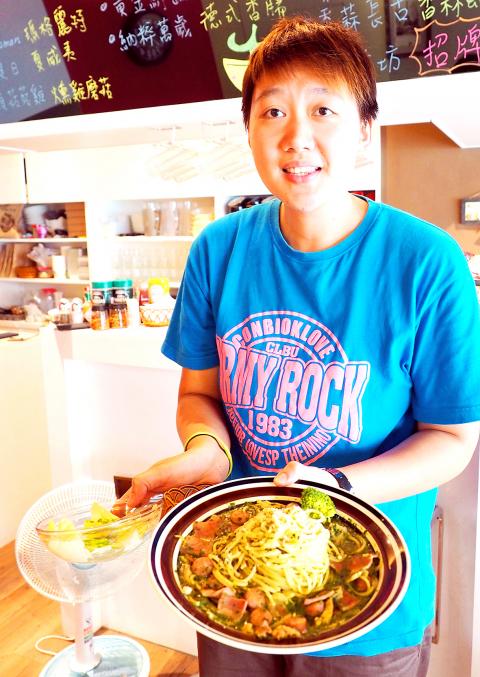The Israeli and German representative offices in Taiwan have expressed shock and regret at an Italian restaurant in New Taipei City’s Banciao District (板橋) serving a dish named “Long Live Nazi spaghetti (納粹萬歲麵),” saying it showed how some Taiwanese lack understanding about history and the Nazi slaughter of Jews and other minorities.
The restaurant owner, Tsao Ya-hsin, was quoted by cable news channel TVBS on Sunday as saying that she named the dish to get customers’ attention, but that she did not wish to specifically place emphasis on the word “Nazi.”
Tsao added that she named the dish so because it contains German sausages.

Photo: David Chang
Asked about their first impressions on hearing the word “Nazi,” members of the public told TVBS said they associate it with the Holocaust, the genocide of approximately 11 million people, including 6 million Jews, by the German military under the command of Adolf Hitler and his collaborators.
This was not the first time a local eatery escaped the bounds of taste. In 2000, a theme restaurant in Taipei caused controversy by displaying several photographs of Nazi concentration camps on the walls. The restaurant owner later pleaded ignorance and removed the images.
In October 2011, President Chain Store Corp, which runs the 7-Eleven convenience stores, removed products featuring an Adolf Hitler-style cartoon figure following complaints.
Mark Lee, a Taiwanese blogger who gained fame with the online comic strips that ridicule corporate bosses using tongue-in-cheek humor, said at the time that the caricature was indeed inspired by Hitler, but added that it was by no means meant to endorse or promote Hitler’s views or Nazi ideology.

A preclearance service to facilitate entry for people traveling to select airports in Japan would be available from Thursday next week to Feb. 25 at Taiwan Taoyuan International Airport, Taoyuan International Airport Corp (TIAC) said on Tuesday. The service was first made available to Taiwanese travelers throughout the winter vacation of 2024 and during the Lunar New Year holiday. In addition to flights to the Japanese cities of Hakodate, Asahikawa, Akita, Sendai, Niigata, Okayama, Takamatsu, Kumamoto and Kagoshima, the service would be available to travelers to Kobe and Oita. The service can be accessed by passengers of 15 flight routes operated by

Alain Robert, known as the "French Spider-Man," praised Alex Honnold as exceptionally well-prepared after the US climber completed a free solo ascent of Taipei 101 yesterday. Robert said Honnold's ascent of the 508m-tall skyscraper in just more than one-and-a-half hours without using safety ropes or equipment was a remarkable achievement. "This is my life," he said in an interview conducted in French, adding that he liked the feeling of being "on the edge of danger." The 63-year-old Frenchman climbed Taipei 101 using ropes in December 2004, taking about four hours to reach the top. On a one-to-10 scale of difficulty, Robert said Taipei 101

MORE FALL: An investigation into one of Xi’s key cronies, part of a broader ‘anti-corruption’ drive, indicates that he might have a deep distrust in the military, an expert said China’s latest military purge underscores systemic risks in its shift from collective leadership to sole rule under Chinese President Xi Jinping (習近平), and could disrupt its chain of command and military capabilities, a national security official said yesterday. If decisionmaking within the Chinese Communist Party has become “irrational” under one-man rule, the Taiwan Strait and the regional situation must be approached with extreme caution, given unforeseen risks, they added. The anonymous official made the remarks as China’s Central Military Commission Vice Chairman Zhang Youxia (張又俠) and Joint Staff Department Chief of Staff Liu Zhenli (劉振立) were reportedly being investigated for suspected “serious

Taiwanese and US defense groups are collaborating to introduce deployable, semi-autonomous manufacturing systems for drones and components in a boost to the nation’s supply chain resilience. Taiwan’s G-Tech Optroelectronics Corp subsidiary GTOC and the US’ Aerkomm Inc on Friday announced an agreement with fellow US-based Firestorm Lab to adopt the latter’s xCell, a technology featuring 3D printers fitted in 6.1m container units. The systems enable aerial platforms and parts to be produced in high volumes from dispersed nodes capable of rapid redeployment, to minimize the risk of enemy strikes and to meet field requirements, they said. Firestorm chief technology officer Ian Muceus said